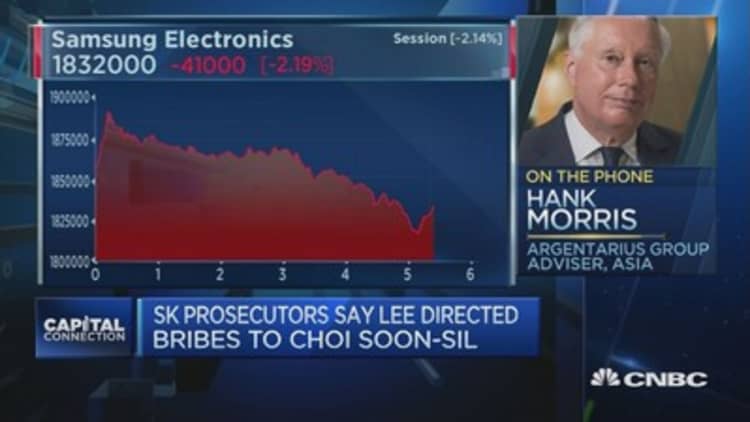South Korean citizens have long demanded government policies to curtail the power of family-run conglomerates, known as chaebols. They may finally get their wish—if opposition parties win the presidential election.
Crony capitalism linked to chaebols is a major issue in Asia's fourth-largest economy, as reflected in an ongoing political scandal that threatens to impeach President Park Geun-hye. Park and her close friend, civilian Choi Soon-sil, are accused of pressuring the nation's biggest enterprises, including Samsung, Lotte, SK Group, and Hyundai, to contribute to foundations that backed Park's programs. Samsung heir Lee Jae-yong was accused of paying bribes worth $36.42 million to Choi but on Thursday, a Seoul judge dismissed a warrant to arrest him.
"Seriously tackling the chaebol will require political, not just legal, action. A lot of these executives have been convicted, only to be pardoned," Robert Kelly, associate professor at Pusan National University, told CNBC.
Analysts say prosecutors will go after Lotte or Hyundai next if a clear trail of evidence is found. The offices of Lotte and SK Group were raided in November as part of the probe but no charges have yet been made. Lotte chairman Shin Dong-bin was indicted in October for a separate corruption investigation involving financial crimes, but avoided arrest.
Kelly, like many others, believe chaebol reform will finally materialize when the public elects a left-leaning president.
"A new government under a left-of-center president would likely accelerate efforts to achieve that goal," echoed Scott Seaman, senior Asia analyst at Eurasia, in a recent note. Opposition parties, such as the Minjoo Party of Korea and the People's Party, have long been discussing legislation to strengthen anti-monopoly and fair trade laws aimed at reducing the excessive wealth and influence of chaebols, he explained.
An election for the five-year single-term presidency is scheduled for Dec. 20 but if a court approves Park's impeachment motion, elections could be held within the next 60 days. The country's Constitutional Court has until June 21 to make a decision.
The leftist candidates in the running include Moon Jae-in from the opposition Democratic Party and Seongnam Mayor Lee Jae-myung of the opposition Minjoo Party. According to a Real Meter poll of 2,525 surveyed adults released on Jan. 9, Moon obtained an approval rating of 26.8 percent, the highest among any candidate.
Park's conservative Saenuri party on the other hand may be less willing to crack down on chaebols as it has traditionally been closer to the nation's family dynasties, flagged Kelly.
Chaebols dominate the Korean economy, with each company operating a range of diverse businesses. Hyundai for example is home to the world's 5th largest automaker, the 15th largest container shipping firm and the 13th biggest steel producer in addition to manufacturing construction equipment and solar panels, among other goods.

Sales revenue generated by the top five chaebols were equivalent to 58 percent of gross domestic product in 2015, according to statistics from the National University of Singapore.
Even before Park's case, public resentment against chaebols was high, with special focus on the economic and social privileges enjoyed by founding families. In 2014, the vice-president of national carrier Korean Air sparked a public uproar by delaying a flight because she was angry at the flight attendant for serving macadamia nuts in a paper bag instead of a plate.
Families running chaebols control a vast network of companies through a circular holding structure and their control rights typically exceed cash-flow rights, so families often wield undue influence over group companies in spite of small direct shareholdings.
But some skeptics believe sweeping reform may be too ambitious, regardless of who wins the election.
"As much as presidential candidates want to tell the people what they want to hear, their campaign promises rarely match up with what they are able to accomplish once they are in office," remarked Steven Ward, assistant professor at Chosun University.
Moreover, chaebols will fight tooth-and-nail against any restrictive policies so the next President may choose to side-step a public confrontation by reviving talk of prosecutorial reform instead, an area where they stand a better chance of success, Ward continued.
The Supreme Prosecutors' Office isn't considered truly independent from politics and has also been embroiled in numerous scandals. In 2012, a senior prosecutor was arrested on charges of bribery while a junior prosecutor admitted to having sexual relations with a female suspect in his office.

